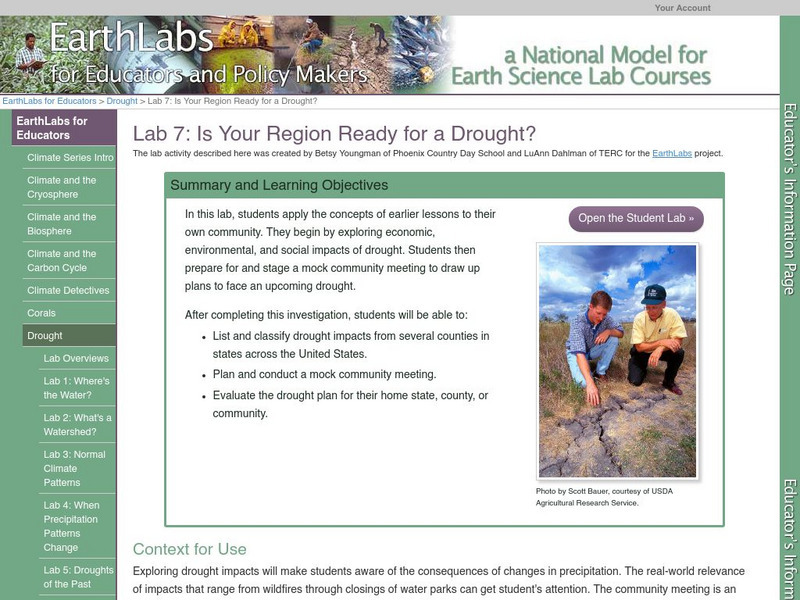Hi, what do you want to do?
Curated OER
Dark Days on the Prairie
Students explore U.S. geography by researching agriculture. In this dust bowl lesson, students complete a cause and effect worksheet based upon the dust bowls that covered a large portion of Oklahoma and Texas in the early 1900's....
Curated OER
Does Global Warming Increase the Intensity of Atmospheric Natural Disasters?
Students study global warming by communicating the problem, process and solutions. In this global instructional activity students use graphs, research and write a critical stance on natural disasters.
Curated OER
Are You an Energy Efficient Consumer?
In this energy consumption worksheet, students use on line resources to explore the energy use by different countries around the world. Students compare the amount of light emitted by different countries and their carbon dioxide...
Curated OER
Pollute Locally, Spread It Globally
Students examine the rate of pollution throughout the world through an interactive program. They define air quality and the air quality index. They examine fuel economy and its impact on the Earth and renewable and nonrenewable resources.
Curated OER
Is Climate Change Good for Frogs?
Students fill out a chart on how climate change would affect them and things around them. In this climate change lesson plan, students discuss how global warming affects them and amphibians and then fill out the chart that goes with it.
Curated OER
Global Change- Time and Cycles
Students study trees and their growth. In this investigative lesson students work in groups to reconstruct a 50 year climatic history using a simulated tree ring.
Curated OER
Time and Cycles - Dendrochronology
Students investigate the lives of trees by examining ring cycles. In this plant life lesson, students identify the field of study known as dendrochronology and discover its history. Students investigate a simulated tree ring...
Curated OER
Mapping Natural Disasters
Students use Cartesian coordinates to plot current natural disasters. They relate location of natural disasters to their specific major project countries. Students tie in geometry within this lesson as connected to spatial relationships...
Curated OER
THE FARMER CARES FOR THE LAND
Young scholars will identify cause and effect relationships in issues relating to Agriculture and the environment.Ask students to describe what farmers do. Then ask young scholars to define the word "environmentalist." Ask students if...
Curated OER
A Long Winter's Nap
Students explore the process of estivation, hibernation and torpor and the ways that frogs adapt to seasonal weather changes.
Curated OER
Do Dams Affect the Paddlefish Population?
Students study why dams are built and what is affected by them. They build model dams and explain how dams can be a detriment to paddlefish population.
Curated OER
Go Fish!
Students are introduced to the culture of the Kumeyaay. Using their text, they discover how they used their native flora and fauna in San Diego. They participate in a matching game and examine the types of organisms who make their home...
Curated OER
Dust In The Distance
Pupils are introduced to the events of the Dust Bowl. Using a map, they locate and label all of the states surrounding and including Oklahoma. After also labeling the counties in Oklahoma, they use the internet to research the weather...
Curated OER
A River Runs Through It
Students evaluate and interpret flood data from Central Texas. They list the tributaries that feed into the Guadalupe River and explain why is it important to include the tributaries in a discussion of the river, especially a discussion...
Curated OER
Oklahoma
In this geography worksheet, students read a 2 page selection detailing the location, history and early statehood of Oklahoma. They answer 10 true or false questions based on the reading.
Curated OER
What's Holding Up the Water?
Students read about the history and locate dams in Arizona. In this Arizona dams lesson plan, students write a summary about what they read focusing on word choice, ideas, conventions, and geography content.
Curated OER
Tracking El Nino Conditions
Young scholars identify major changes in ocean temperatures during an El Nino season. In this climate lesson students complete an Internet assignment using datasets to determine periods of El Nino.
Curated OER
Hey, You Stole My Rain!
Young scholars review various scenarios in regards to the water cycle to determine what the best solution is to the problem. Students write their opinions on the controversies.
Curated OER
What does AG have to do with me?
Students practice alphabetizing while categorizing sources of basic agricultural products. They discuss agricultrual products, discover where they are grown and draw a simple agricultural scene on poster board.
Science Education Resource Center at Carleton College
Serc: Lab 7: Is Your Region Ready for a Drought?
A lab experiment in a series of experiments that explores droughts. In this particular lesson, students look at the impact a drought would have on their own community by exploring the economic, environmental, and social consequences of a...
Science Buddies
Science Buddies: Dry Spells, Wet Spells: How Common Are They?
Here's a project that looks at what the weather was like for over a hundred years. The goal of the project is to compare long-term precipitation patterns in different regions of the country. You will work with historical climate data,...
PBS
Pbs Learning Media: North American Monsoon
NASA tracked rainfall and soil moisture for a three-month period in 1993 to confirm that these rain patterns were indeed a monsoon. Watch this animation to see the relationship between soil moisture and rainfall in the Southwest U.S. By...
PBS
Pbs Teachers: Life in the Sahara (Lesson Plan)
A lesson in which students share prior knowledge and conduct research about the location, people, and animals of the Sahara region of Africa. Involves the creation of a project about the geography of the Sahara and how desertification...
Texas State Historical Association
Texas State Historical Association: Texas' Natural Environment
Presents information and data on all aspects of the geography, natural resources, and climate of Texas, including natural disasters and extreme weather events.




























